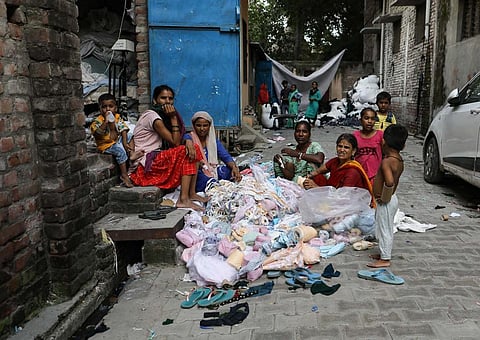

Reclycing polyester has been touted as one of the ways to reduce plastic waste burden of India. But the collection and reclycling processes were found to be informal to a large extent, leading to lethal plastic pollution. Down To Earth (DTE) visited the Panipat second-hand market to understand how the industry operates.
Polyester is sourced from two sources: Virgin polyester that is directly produced from petrochemicals and recycled polyester that is made from used PET (polyethylene terephthalate) bottles commonly used for containing beverages.
India’s Reliance Industries is one of the world’s largest producers of virgin polyester, and the country is also a major recycling hub for it.
This indicates that many in the textile recycling business — with the market for polyester having boomed in recent years — may be recycling plastic converted into fibre and yarn form.
Over 70 big and small polyester recycling units exist in the industrial cluster, and they receive second-hand clothes, primarily from Morocco, Dubai, Canada and The European Union, according to the local traders.
“Except for Surat, where polyester clothes are recycled to make new clothes, all the other hubs in India downcycle to make home furnishing products, particularly carpets,” said Paras Ali, head of Global Textile Overseas, a Union Ministry of Textiles-certified recycling unit at Panipat.
China is the largest manufacturer of garments, followed by Bangladesh, Vietnam and India.
The Panipat example showed that India has a huge market for textile recyclability but the problem is that majorly it is an informal sector.
DTE visited a polyester blanket manufacturing factory in Panipat, with a warehouse containing all sorts of polyester and viscose waste. Safety norms were not followed in this unit, it was found. The workers were seen to be at huge risk of inhaling microplastics.
Bangladesh also manufactures polyester in abundance, for which granules are imported from China and Vietnam in abundance, said Ali. “It also imports yarn for the manufacture from various developed countries.”
He added:
The reason yarn is exported by these countries to India and Bangladesh for the purpose of recycling textile at a large scale, instead of proceeding with the recycling in their country itself, is the availability of labourers who are ready to work at much cheaper wages in the latter.
Apart from Panipat, the major polyester recycling centres in India are in Ludhiana and Samana in Punjab, Ahmedabad, Surat, Rajkot and Gandhinagar in Gujarat.
“Almost 80 per cent of the downcycled products are exported, while the remaining 10 per cent are used to meet domestic demand,” said Ali.
Global Textile Overseas is among the handful of the Union Ministry of Textiles-certified recycling units in Panipat.
After import, the garments are first sorted, then shredded and pulped to make a range of products from doormats to blankets and bed linen.
The end-product is a mix of recycled and virgin polyester, according to Ali. “Most carpets in Panipat, for instance, have 60 per cent recycled polyester and 40 per cent virgin polyester.”
The quality improves as the share of virgin polyester increases.
Home furnishings produced at Panipat factories cannot be recycled again and are sent to landfills or burned at the end of their life-cycle, according to recycling unit owners.
Dharmesh Shah, senior advisor at LIFE, a public interest environmental law group at the national level, said:
Blended polyester clothing is a major challenge downstream. If a piece of clothing is completely made of a single fabric, it can be recycled again. But once blended with other fabrics, they can only be downcycled.
“Most clothing articles are blended to keep the price under check, but it is not sustainable. Manufacturers are just not bothered,” he added.
Stockists in Delhi’s Old Seelampur and Gandhinagar markets, which have thousands of shops dealing in polyester, also confirmed most of the sector functions informally. Wholesalers were seen loading polyester blanket covers on push carts throughout Old Seelampur.
“Delhi only has a readymade market for polyester and we sell it all in retail, surplus and as readymade garments,” said Tinkle, a shopkeeper who deals in polyester. “There must be thousands of shops for polyester garments here. Here, we get our supplies from Maharashtra, Gujarat, Rajkot and Kharad (Uttar Pradesh).”
Illegal import of textiles takes place across the country, including readymade market dealing in polyester garments in abundance at Karol Bagh, said a shopkeeper at Old Seelampur market. A lot of the polyester sold in Karol Bagh is imported from European countries and China, according to another shopkeeper in Seelampur.
“The polyester waste clothes we buy from stockists are cheaper. The recycling cost in India is cheap, that is another reason for polyester clothes waste imports here from the west,” said Ali.
By partially lifting the ban on import of plastic wastes on September 9, 2022, the central government allowed plastic recyclers 95,105 tonnes of PET flakes to feed their plant. This even after domestic waste collectors and environmentalists expressed concern that the move will dilute India’s existing policy on dealing with plastic waste, causing more littering and pressure on landfills
In 2019, the government had banned the import of PET in an attempt to encourage domestic waste collection as well as push recyclers to use plastic waste available within the country.